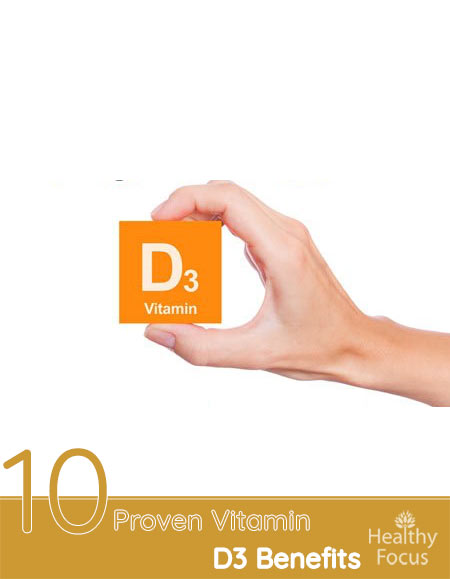Last Updated on August 19, 2021 by Marc Seward
What is Vitamin D3?
Looking to get more of the sunshine vitamin benefits? Not getting enough sun? Not eating enough vitamin D-rich foods? Think you can stand to get a little bit more to support your health?
Very good! Vitamin D is essential to your overall health and making sure you get enough is paramount to your well-being. Before you get started, it is important to know that there are different types of vitamin D: vitamin D3 and vitamin D2.
Vitamin D3, also known by its other alias cholecalciferol, is vitamin D in its natural form–the kind produced in your body as it absorbs sunlight. However, recent studies are beginning to find that vitamin D2 may be as effective as vitamin D3.
Whichever form of vitamin D you choose to take, make sure you get enough so you can enjoy healthy teeth and bones while protecting yourself from disease.
The Role of Vitamin D3
Another surprising thing about vitamin D3? It’s not actually a vitamin, but a pro-hormone. It’s considered a pro-hormone because the body is able to produce it on its own by absorbing sunlight on the skin.
Other vitamins and nutrients are unable to be produced by the body and therefore must be obtained via diet and supplements. The body needs to store a healthy amount of vitamin D in order absorb phosphorous and be able to maintain normal levels of calcium. In fact, vitamin D is essential to many functions in the body:
- Vitamin D is necessary for the maintenance of strong bones and healthy teeth.
- Keeping a healthy store of vitamin D gives added protection to such diseases as cancer, multiple sclerosis, and type 1 diabetes.
- Helps with diabetes management and maintaining healthy insulin levels.
- Vitamin D offers immune support as well as protection to the nervous system and the brain.
- Vitamin D is essential to the health of the lungs and cardiovascular system.
- Helps inhibit the development of cancer.
Vitamin D3 Benefits
Vitamin D3 serves many purposes in the body, from strong bones to cancer protection. Below are the potential ways vitamin D3 can benefits your health:
1) Strong Bones
The number one way to maintain strong, healthy bones? Calcium! Your bones need calcium to maintain the health and mineral density of your precious skeleton, but as it turns out, getting enough vitamin D is essential to calcium absorption in your bones and body.
Studies have shown that your body needs vitamin D to get calcium deposits in the bones. If you are vitamin D deficient, your bones won’t be getting these very necessary calcium deposits—in fact, your body will remove these calcium deposits from the bones and absorb it into the blood stream.
This will result in weak and brittle bones that are prone to fractures. Getting enough vitamin D helps protect your bones from such diseases as osteoporosis and rickets.
2) Skin
Your skin is your largest organ and vitamin D is critical to its health. The active form of Vitamin D (calcitriol) helps with skin repair and growth. Vitamin D3 is the precursor to Calcitriol. As you get older your body loses the ability to produce D3 which leads to a weaker immune system and weaker skin.
3) Healthy Muscles
Getting enough vitamin D helps your body to lose fat while building muscle and strength. Studies have also found that those deficient in vitamin D may experience chronic muscle pain, achiness, and fatigue.
4) Diabetes
Studies have found that those not getting enough vitamin D have a more difficult time managing their diabetes. Getting enough vitamin D can potentially help diabetes patients better manage their diabetes by helping to regulate glucose levels. Current research suggests that maintaining adequate levels of vitamin D also helps prevent the development of both types of diabetes.
5) Influenza
Getting enough vitamin D may be another way to avoid the nasty flu virus. Studies have found that getting enough vitamin D may potentially cut your chances in half of coming down with the flu.
6) Heart Disease
More and more studies are finding that vitamin D may help improve your cardiovascular health. This vast body of research has found that getting enough vitamin D may protect your heart from inflammation, high blood pressure, and insulin sensitivity among many other potential heart health hazards.
7) Autoimmune Disorders
More and more studies are finding a potential link between vitamin D deficiency and many autoimmune disorders. These studies found that that if you’re not getting enough vitamin D, you may increase your risk for such autoimmune disorders as lupus, Crohn’s disease, rheumatoid arthritis, multiple sclerosis, chronic lymphocytic leukemia, and colorectal cancer.
8) Depression
Although there is not enough scientific research on the subject, many believe that low levels of vitamin D may be linked to depression. Serotonin, a mood altering hormone in the brain increases when you are exposed to bright light, particularly sunlight.
9) Cholesterol and Triglycerides
A 2013 Study in the Journal of Lipids found vitamin D deficiency was associated with dyslipidemia (2). Dyslipidemia is elevated blood levels of either Triglycerides, Cholesterol or both.
The study found:
- Low levels of Vitamin D3 are associated with elevated levels of Cholesterol (about 129% higher). Specifically, people with Low Vitamin D levels had higher LDL Cholesterol ( “Bad” Cholesterol) levels.
- Low levels of Vitamin D are also associated with higher Triglycerides. People deficient in D had about 115% higher levels than those with Normal Vitamin D levels.
10) Weight Loss
Supplements and Herbs that claim to have Weight Loss benefits are often suspect and end up being parts of fad diets that do not work. There are some studies suggesting that Vitamin D can help with weight loss.
A 2012 study done over 12-weeks showed supplementation with Vitamin D3 did result in a decrease in overall fat mass (1). A couple of things to note:
- The study was done with overweight and obese women.
- The study did not find any significant change in overall weight.
So it may not be a silver bullet for weight loss—but it likely helps to reduce fat. It would seem likely that overweight and Vitamin D deficient people would benefit more.
How to Get Vitamin D3
Sunlight
You do not need a lot of sunlight for your body to synthesize vitamin D3. Experts say that getting five to ten minutes of sunlight on bare skin two to three times a week. This is not so easy in the winter months or parts of the world that don’t get a lot of sunlight.
As a result, as much as 50% of adults and children in the world suffer from a vitamin D deficiency. People that are older or darker skin may have trouble absorbing sunlight and therefore may need to turn to a supplement or may need to incorporate vitamin D-rich foods in their diet.
Diet
If you think you’re not getting enough vitamin D in your diet, consider adding the following foods into your diet:
- Fatty Fish: Fatty fish such as mackerel, trout, tuna, salmon, and eel are vitamin D rich foods that are also loaded with omega-3 fatty acids offering bonus cardiovascular protection.
- Canned Tuna: You don’t have to just rely on fresh fish to get your daily dose of vitamin D—you can boost your vitamin D intake with canned tuna as well.
- Fortified Milk: Fortunately, most milk produced in the United States is fortified with vitamin D. By drinking at least one 8-ounce glass of milk a day, you can get 100 IUs of vitamin D. Some rice and soy milks are fortified with vitamin D; be sure to check the label before purchasing. Some yogurts may be fortified with vitamin D as well.
- Fortified Orange Juice: Those not up for digesting dairy, vegans, and those that simply don’t enjoy milk can boost their level of vitamin D with fortified orange juice. Just like with milk, drinking an 8-ounce glass of fortified orange juice can earn you up to 100 IUs of vitamin D. Not all orange juices are fortified with vitamin D, so be sure to check the label before heading to the checkout aisle.
- Fortified Cereal: Making the right breakfast choices in the morning can have a tremendous affect on your health, particularly in terms of fortifying your body with enough vitamin D. Such cereals such as Multi-grain cereals are rich in vitamin D. Not to mention the added boost of vitamin D you get when eating it with fortified milk.
- Eggs: Since eggs are incorporated in lots of dishes and deserts, they are an easy way to boost your levels of vitamin D. When using eggs, be sure to use the whole egg, as most of the vitamin D in eggs is located in the yolk.
Vitamin D3 Supplements
Supplements are a good option if:
- You are not able to get adequate amounts of sunlight
- Find it difficult to incorporate enough vitamin D-rich foods into your diet
If it is too difficult to incorporate the natural sources, then you can take a vitamin D3 supplement.
Many people are Vitamin D deficient—especially in the winter so moderate supplementation is probably a good idea. Before diving into the world of mega-dosing D3, be sure to speak with your physician first. Overdosing on a vitamin D supplement can be toxic and therefore detrimental to your health.
Speaking with your doctor can help determine the right amount of vitamin D for you. Blood samples are needed to run a 25-hydroxy (or 25-OH) vitamin D test. This blood test is best way to determine how much Vitamin D is in your body.
For all forms of vitamin D (sunlight, food, and supplements), the recommended dosage is 4,000 IUs for people nine years of age or older. Without a blood test I would not recommend going higher than that.
Side Effects of D3
Too much Vitamin D can lead to Hypervitaminosis D (Vitamin D toxicity). This rarely occurs except people who mega dose on Vitamin D. Vitamin D is fat soluble—so you can consume too much.
Some symptoms of Excess Vitamin D include Constipation, Fatigue, Dehydration, Vomiting and decreased appetite.
Because Vitamin D and calcium are related too much Vitamin D can lead to Calcium issues. These issues include, Hypercalcemia, Kidney Stones and Kidney damage.
If you stick to Vitamin D3 from the sun and in your diet you should be safe. With Supplements and Vitamins stick to 4,000 IU or less. At those levels it is very unlikely you will run into any issues.
(1) https://nutritionj.biomedcentral.com/articles/10.1186/1475-2891-11-78
(2) http://www.ncbi.nlm.nih.gov/pmc/articles/PMC3880703


Leave a Reply
You must be logged in to post a comment.